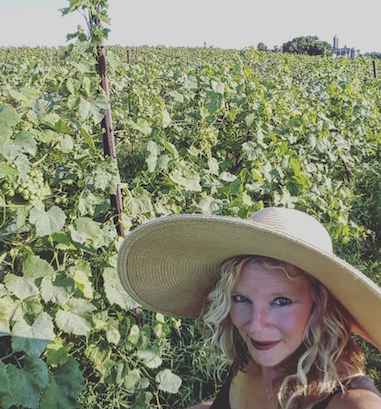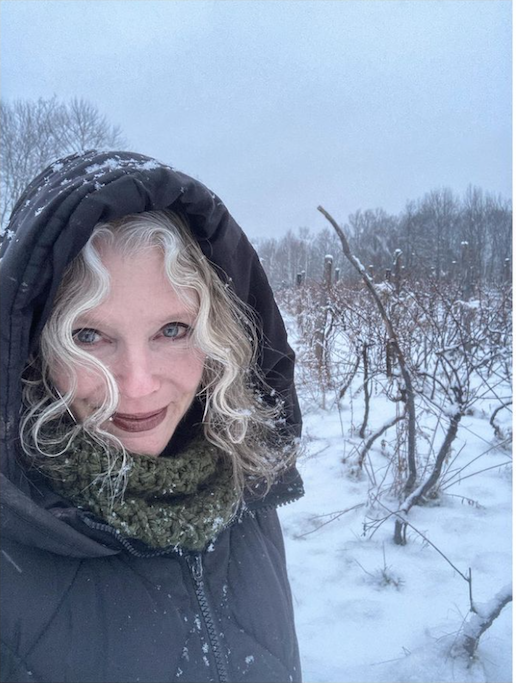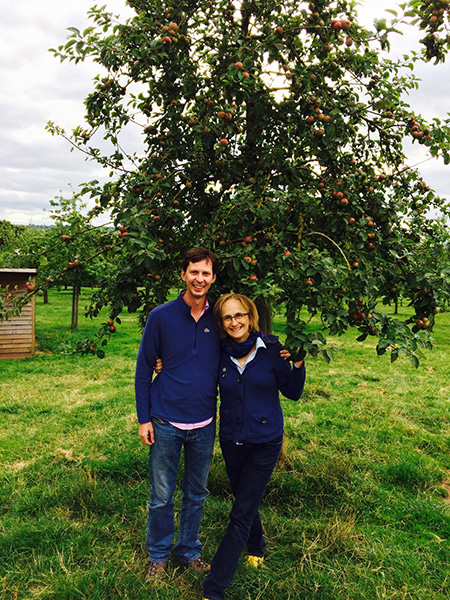Wine taste snobbery
Why can’t a hybrid wine from Vermont be as good as one from Burgundy? Maybe, as Dogberry says in Much Ado About Nothing: “Comparisons are odorous.” Or you might as well compare chalk and cheese. (NB note to self, cheese is not great for writing on the sidewalk). Or compare cider to wine? That’s not apples and pears, by the way, that’s apples and grapes and ne’er the twain shall meet, unless they be blended with each other, or the juice of one fermented on the skins of the other.
The statement is “great wine can be made from hybrid grapes”. I can imagine the reaction in cultivated wine circles to be similar as to when the Houyhnhynms looked down their long faces at Gulliver.

I said the thing which was not;” for they have no word in their language to express lying or falsehood. “He knew it was impossible that there could be a country beyond the sea, or that a parcel of brutes could move a wooden vessel whither they pleased upon water. He was sure no Houyhnhnm alive could make such a vessel, nor would trust Yahoos to manage it.”
Loving natural wine – which according to grave divines tastes more like cider than it does wine – probably makes me a Yahoo in wine terms. Yet, I feel rational enough to dare to say the thing that was not. Which is to say a proposition not accepted by experts can still either be true or have enormous merit.
Wine, as we know, is the product of 1001 processes, major and minor decisions. Wine also exists in two worlds – the uniqueness of place and climatic conditions, the reality of everyday choices, the skill and graft of the vignerons, the numberless small shaping actions, and the world of commercial classification and received wisdom in which hierarchies of taste matter.
Given the almost infinite variety of the former, it seems counterintuitive to focus on the pinpoint peak of the hypothetical pyramid of quality.
My witnesses for the prosecution (or the defence) are the wines of La Garagista and the ciders of Little Pomona.
The question revolves around our perception of quality. Not just quality but great quality. We surely must first focus on origin, then process, and finally the perception of flavour.
There is a strong feeling that certain places will produce amazing wines. Centuries ago, monks planted vines in what they presumably deemed to be the best locations for them to flourish. Generations mapped the land, discovered by experience the best soils and expositions.
Wherever one goes in wine country, the vine communes with its surroundings. Climate matters, soils matter, aspect matters. In certain locations, the entire of a region may be dedicated to vine farming and winemaking. These areas will attract expertise and investment. The wines will become prized, deemed worthy of the epithets “classic” and “great”.

What of those places without a long and distinguished culture of winemaking that we are less familiar with? Genius, bringing about a pure vision by means of hard work, can be found anywhere. La Garagista is a tiny farm and winery in a forest on the side of a mountain in Vermont, a state renowned for long cold winters and short summers. Here vine growing is at the very extremes, only particular hybrids are capable of surviving these climatic conditions. Two questions arise: firstly, can one make world-class wines in extreme climates, and the same regarding hybrids.
The first question is easy to answer. World class wines may be made in any location if the conditions are right.
As to grape variety, we need to stop thinking about the value of the varietal as if it can be classified in a league table of relative quality. The variety of the grape will contribute to the flavour package but it is not the be all and end all. There are so many more contributory reasons why a wine may be interesting or great. And those will include the vineyard, the farming and the winemaking choices.
In Vermont, you will find examples of La Crescent, Brianna, Frontenac Blanc, Marquette and Frontenac Noir, hybrids developed to survive the long hard winters.
Next we look at the farming. The vineyards are in several locations by Lake Champlain as well as a home vineyard by their house in Chateauygay near Mount Barnard. None of these plots of land have ever been sprayed with chemicals. Deirdre and Caleb tending and encouraging the vines. The soils are brimming with life – they use the concepts of permaculture as well as biodynamics to give energetic life to the vineyard.
The philosophy that underpins this natural farming approach is brought into the winery. Deirdre understands to make delicious natural wine that you have to taste all the time. Vine growing and winemaking are gentle nurturing processes. But it is her sense of the wine and her particular taste that guides these living liquids on their journeys. Her palate favours pure and traditional Italian styles of wine – the whites are generally skin-macerated whereas the reds combine amaro flavours with vibrant acidity. There are also pet nats and vin ed pommes (a style traditionally made in Valle d’Aosta) in which cider was fermented on grape skins.
To taste. These feel like alpine wines and that Deirdre and Caleb are truly working with what nature gives them. But what distinguishes the wines is their inner life. They are vital, untrammelled, thrilling amalgams of fruits, flowers and herbs. They are not like wines which have a classic architecture but have the countryside in their hearts. Even more interesting is that even in a relatively short period of time, each site (or climat as the French would say) is giving different character to the grapes and therefore to the final wine. As well as their energy, the wines now have strength and depth.
Are they great wines? Greatness in wine has always been viewed as the quality of being epic, often referring to a style of one that has been built (deliberately) brick by brick over a period of time and stands as a monument for the best of human endeavour. Greatness is usually applied to the noble grape varieties: Chardonnay, Riesling, Pinot Noir, Cabernet Sauvignon, Nebbiolo & Sangiovese, as these are associated with classic wine growing regions that have a long and proud lineage.
All very well, but what is actually in the glass? And why is the beaten track necessarily better than the road less travelled? And what is it about taste that our expectations of what something should be like completely blind us to the beauty of those things that fall outside our experience? We’re in different flavour country with the wines of La Garagista – as we should be. For those open to original taste sensations, then these wines may be beautiful, great even, if we feel the need to mark them in such a fashion.
Next, we come to cider. The UK is home to around 1,000 heritage apple varieties and cider making enjoys a long history. Apples, of course, make so many different styles of drink, according to the varietal or the blend, and the method of pomology.
Cider comes in many forms. On the one hand, we are all-too-familiar with the mass-produced fizzy that is pasteurised, carbonated and cold-filtered and uses flavouring agents to get its essential “appliness”. At the other end of the scale, is the rough, full-bodied homemade drink called “scrumpy”. Cider can be so much more. With rigorous selection and careful “pomology” one can find delicious and sophisticated beverages that merit the same respect as wine.
Yes, cider with its noble heritage, might be called the wine of Britain. We have the climate, we have the native apple varieties, and we have the tradition. What is lacking is the confidence to work with apples in the same spirit as natural vignerons work with grapes, in other words, to let natural processes take their course, to ferment wild, to show vintage variation, to mature in barrels to give an extra dimension and textural layers, to bottle without further additions, not to filter out the cidery goodness. James and Susanna Forbes do all the above at Little Pomona. The small-batch cider-making approach allows them to be inventive and take risks. As a result, they produce so many different styles, demonstrating the sheer versatility of cider.
They know that, we know that, a few cider aficionados know that and others who are open to discovering exciting flavours. But the wine trade, and particularly sommeliers, either haven’t received the message or remain to be convinced. If you prone to slot cider into the it’s-only-apples box, view it purely as a non-wine beverage for immature palates, or one incapable of exhibiting great quality, then you will never taste the true qualities that these ciders exhibit.
Ciders are usually hived off to some hidden part of the list and may be found in an “other drinks” section or possibly as an aperitif, both of which totally ignores their gastronomic potential. The cider flavour profile may both broad and very subtle; the descriptors we end up using are very similar to wine, and when we describe wine we don’t talk about it tasting of grapes.
I think there is an unconscious snobbery towards cider from within the wine trade. Rather than criticise commentators and gatekeepers for their ignorance and lack of adventure, it behoves those who make cider and others who sell it and appreciate its virtues, to keep on banging away and get the ciders in front of people, using the opportunity to educate as much as possible.
Greatness is a hallowed wine term, but rather than being used to express the ineffableness of a wine, it is more an assumption of the merited status of very well-known classic wines. Greatness is ascribed to iconic wines, to domaines that seem to consistency garner high marks, to oenologists, to wineries even, but not to qualities that are different to quantify and circumscribe: deliciousness, purity, energy, beauty… They say the best bottle is the empty bottle on the table. My kitchen table has plenty of empty bottles of La Garagista and Little Pomona on it.
*
Interested in purchasing the exemplary wines/ciders of La Garagista and Little Pomona? Contact us directly:
shop@lescaves.co.uk | sales@lescaves.co.uk |
01483 538820



Pingback: Thoughts on 2024 – Les Caves de Pyrene